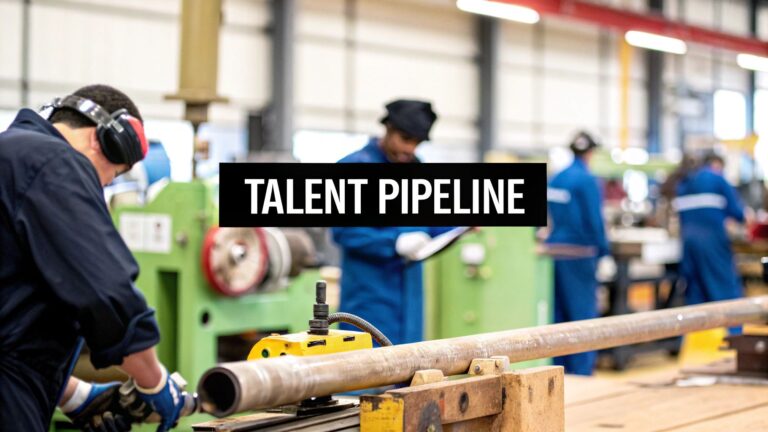Introduction
A well-thought-out, customized compensation strategy that aligns with both employee expectations and business goals can do wonders in attracting and retaining top talent. A PayScale report states that while employers have gained the upper hand in the job market, they still need to keep an eye on ensuring that their compensation strategy wows prospective candidates.
This article discusses key factors that companies should consider to design tailored compensation plans that promote employee satisfaction and drive business performance in the engineering industry.
Understanding Workforce Demographics
The engineering workforce encompasses employees with a range of ages, experiences, and educational backgrounds. Recognizing these demographics is essential for crafting compensation strategies with which employees can relate.
For instance, a younger workforce might value career development opportunities and educational reimbursements over higher base salaries. On the other hand, experienced engineers might prioritize stock options or comprehensive retirement support plans.
Moreover, fostering diversity and inclusion in compensation plans can help attract a wider talent pool. Companies like Google have made significant strides by offering inclusive benefits such as extended parental leave and support for gender transition, setting a benchmark for others in the industry.
Analyzing Market Competitiveness
There’s strong demand for skilled engineers with knowledge of emerging technologies like AI, ML, lean manufacturing, data analytics, and similar skills. Companies are willing to go above and beyond to hire quality talent. Hence, to attract and retain talent, companies should regularly evaluate their compensation structure to determine if it matches industry standards and resonates with the present market trends.
Utilizing salary surveys and industry reports helps in understanding where the company stands in terms of compensation and identifying areas for improvement. Tools like PayScale and Glassdoor provide valuable insights into industry compensation trends, helping companies make informed decisions.
Aligning with Business Goals and Financial Health
A well-crafted compensation strategy is about finding a balance between rewarding employees and being financially sustainable for the business in the backdrop of its goals and ambitions. A popular way to ensure this is by linking a portion of compensation to performance.
For instance, Tesla ties significant portions of executive pay to performance milestones and stock price. This not only aligns leadership incentives with business success but also conserves cash flow. For smaller engineering firms, it’s vital to assess financial stability and growth plans before implementing similar strategies. Balancing immediate financial constraints with long-term investment in talent is key to sustainable growth.
Diversifying Compensation Components
A robust compensation strategy goes beyond base salaries. It includes variable pay, performance-based incentives, stock options, and non-monetary benefits such as flexible working, work recognition, child care, and promoting employees to focus on hobbies.
Additionally, offering health insurance, retirement plans, and wellness programs can enhance the overall attractiveness of the compensation package. Engineering companies should tailor these components to meet the specific needs of their workforce, ensuring a holistic and appealing compensation plan.
Fostering Employee Development and Career Growth
Linking compensation to employee development and career growth can significantly boost motivation and retention. Providing opportunities for continuous learning and professional development not only benefits employees but also enhances the company’s capabilities.
For instance, General Electric has a well-established program that offers tuition reimbursement for employees pursuing MBAs and other higher studies. This investment in employee growth is reflected in improved performance and loyalty. Engineering companies across the board can adopt similar practices to enhance employee well-being; By offering educational stipends, funding for certifications, and clear career progression paths linked to compensation increments.
Read Now: Best Strategies to Retain Talent in 2024
Ensuring Flexibility, Adaptability & Transparency
The ability to adapt compensation strategies to changing market conditions and individual needs is crucial to stay competitive and attractive for employees.
Regularly reviewing and updating compensation policies ensures they remain relevant to the present times. Engineering companies should also put in concerted efforts to implement transparent compensation practices and actively seek employee feedback to continuously improve their strategies.
By creating a culture where employees feel valued and recognized, companies can boost morale and reduce turnover rates. Implementing regular performance reviews, recognition programs, and open communication channels are effective ways to enhance employee engagement.
Legal and Compliance Considerations
Compliance with labor laws and regulations is an important aspect of any compensation strategy. Ensuring adherence to legal requirements mitigates risks and fosters a fair work environment.
It is also important that companies adhere to minimum wage rates and follow non-discrimination policies to attract top talent. Engineering companies like Intel have made headlines for their commitment to pay equity and conducting annual pay audits to ensure fairness. Staying informed about changes in labor laws and regulations helps companies avoid legal pitfalls and maintain a positive reputation.
Conclusion
Crafting a customized compensation strategy for engineering companies involves factoring in multiple aspects, and requires in-depth understanding of each of those factors. As the engineering landscape continues to evolve, staying ahead in the talent market necessitates a thoughtful and dynamic approach to compensation.
Engineering companies that invest in tailored compensation strategies will not only attract top talent but also foster a motivated, loyal, and high-performing workforce.
Taggd helps engineering companies design sustainable compensation strategies by thoroughly understanding their business goals, and then recommending solutions aligned with the latest trends and insights gathered through its extensive market research activities.
To know more about our compensation strategy services for the engineering industry, contact us at contact@taggd.in.









